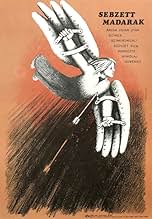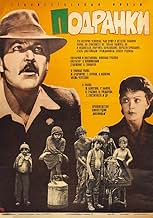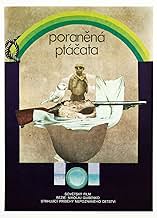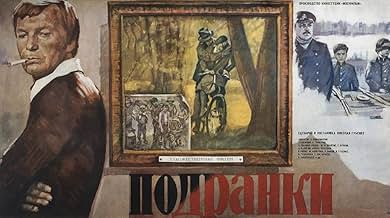IMDb-BEWERTUNG
7,6/10
461
IHRE BEWERTUNG
Füge eine Handlung in deiner Sprache hinzuA story about a group of Russian boys who have lost their fathers in the World War II.A story about a group of Russian boys who have lost their fathers in the World War II.A story about a group of Russian boys who have lost their fathers in the World War II.
- Regie
- Drehbuch
- Hauptbesetzung
- Auszeichnungen
- 1 Nominierung insgesamt
Aleksei Cherstvov
- Alyosha Bartenev
- (as Alyosha Cherstvov)
Zhanna Bolotova
- Alla Konstantinovna
- (as Zh. Bolotova)
Rolan Bykov
- Vladimir Gromov
- (as R- Bykov)
Nikolay Gubenko
- Grigoriy Albertovich Krivoruchko
- (as N. Gubenko)
Natalya Gundareva
- Tasya
- (as N. Gundaryeva)
Evgeniy Evstigneev
- Storozh internata
- (as Ye. Yevstigneyev)
Zoya Yevseyeva
- Valka Gandin
- (as Z. Yevseyeva)
Bukhuti Zakariadze
- Director internata
- (as B. Zakariadze)
Panteleymon Krymov
- Sergey Makarovich
- (as P.Krymov)
Viktor Filippov
- Filippov
- (as V. Filippov)
Valentina Berezutskaya
- Valyusha
- (as V.Berezutskaya)
Daniil Netrebin
- Danya
- (as D. Netrebin)
Georgi Kavtaradze
- Ychitel fizkulturi
- (as G. Kavtaradze)
Lyudmila Shagalova
- Nina Grigoryevna
- (as L. Shagalova)
Mikheil Kherkheulidze
- Ytilshchik
- (as M. Kherkheulidze)
Empfohlene Bewertungen
Podranki is an emotionally harrowing Russian post-WWII film that lingers long after the credits fade. With careful precision, it examines the lives of children left behind by war through a raw, unflinching portrayal of loss and emotional survival.
The film centers on two/three orphaned boys (depending on which position you may take) whose paths diverge in the face of the same tragedy: the death of their fathers in the war. One boy gradually internalizes the loss, folding it into his identity with a stable acceptance all through his successes in writing which lasts into his adulthood. The other cannot settle for that. He burns for retribution, closure, or perhaps just a reason, something that might give shape to the pain. In retrospect, something clearly evident as they meet for the first time. Their contrast is stark, not in confrontation, but in how each embodies a different answer to their grief.
Framed by the reflections of the boy who survived, now an adult novelist revisiting the memories of his broken childhood, the film quietly reveals the cost of these divergent paths. His voice is calm and contemplative, stands in heartbreaking contrast to chaotic trajectory of his companion, whose absence in the adult timeline fortells his spiraled timeline.
This adult perspective is used sparingly, but does little to diminish the effects of the story. It doesn't soften the 'coming of age' archetype but allows the viewer to feel the weight of memory as something still raw, still unresolved.
Stark landscapes, hollow interiors, and haunted glances do most of the talking. Not to mention how the translations of this title, "The Orphans" or the "Wounded Game" or more succinctly, "Wounded Birds" are displayed throughout the scenes in the form of crows; a metaphor within itself.
Podranki isn't just a war film. It's a parable, for childhoods cut short, for futures lost, for the things that grief can twist or preserve. A film of aching contrasts, it captures both the tragedy of death and the more complicated burden of survival.
One item of Note: MosFilms, the Soviet/Russian film studio responsible for this work (and nearly every other from the Russian film industry) has pledged to remaster much of their cinema, including this one, and make them available for viewing with subtitles in most widely spoken languages.
The film centers on two/three orphaned boys (depending on which position you may take) whose paths diverge in the face of the same tragedy: the death of their fathers in the war. One boy gradually internalizes the loss, folding it into his identity with a stable acceptance all through his successes in writing which lasts into his adulthood. The other cannot settle for that. He burns for retribution, closure, or perhaps just a reason, something that might give shape to the pain. In retrospect, something clearly evident as they meet for the first time. Their contrast is stark, not in confrontation, but in how each embodies a different answer to their grief.
Framed by the reflections of the boy who survived, now an adult novelist revisiting the memories of his broken childhood, the film quietly reveals the cost of these divergent paths. His voice is calm and contemplative, stands in heartbreaking contrast to chaotic trajectory of his companion, whose absence in the adult timeline fortells his spiraled timeline.
This adult perspective is used sparingly, but does little to diminish the effects of the story. It doesn't soften the 'coming of age' archetype but allows the viewer to feel the weight of memory as something still raw, still unresolved.
Stark landscapes, hollow interiors, and haunted glances do most of the talking. Not to mention how the translations of this title, "The Orphans" or the "Wounded Game" or more succinctly, "Wounded Birds" are displayed throughout the scenes in the form of crows; a metaphor within itself.
Podranki isn't just a war film. It's a parable, for childhoods cut short, for futures lost, for the things that grief can twist or preserve. A film of aching contrasts, it captures both the tragedy of death and the more complicated burden of survival.
One item of Note: MosFilms, the Soviet/Russian film studio responsible for this work (and nearly every other from the Russian film industry) has pledged to remaster much of their cinema, including this one, and make them available for viewing with subtitles in most widely spoken languages.
Nothing spectacular here, but quite interesting and very well done in spots.
This is a film primarily about children--namely Russian boys who have lost their fathers in the Great Patriotic War (i.e., World War II)--but it ends up being anything but a conventional children's story.
Gubenko (who wrote, directed and acted in the film) is far more interested in conveying the mood of those disheartening and depressing years in the late 1940's (which turned out so tragically different from what most Soviet Russians had been expecting) than in connecting all of the dots in the storyline. This ends up working rather well, because the film has a tendency to move in directions you'd like it to, dwelling on certain moments while skipping rather rapidly through others (or treating them elliptically).
In addition to dealing with the childhood years of the protagonist, his siblings, and his fellow "podranki" (a word, by the way, which is very hard to translate successfully into English--"orphans" is too generalized and weak; better is the term "wounded birds," since these young boys really do face serious obstacles preventing them from "flying" normally into the future--plus it is no accident that the film makes plentiful use of birds, particularly rooks, as backing imagery throughout), the film also has somewhat brief "present-day" segments (i.e., taking place in the mid 1970's) involving some of the characters as adults. One would always like to see more of Georgi Burkov--but short as his scene is, he comes through as always, playing the protagonist's disillusioned and broken convict brother.
In certain ways "Podranki" can be compared to Tarkovsky's 1975 film "Zerkalo" ("The Mirror")--and many aspects of the baroque music, the sets, the moods (and even some of the episodes themselves) here seem to have been directly influenced by Tarkovsky. Both films also of course deal with fathers who are missing because of the war. But "Podranki" is not nearly as complex or difficult--for example, the switches between the 1940's and the 1970's here are always easy to follow (whereas it can take quite awhile to recognize the dual characters and time periods in the Tarkovsky). In fact, I would actually recommend "Podranki" as a good preparation for approaching "The Mirror."
"Podranki" is not a world classic by any means, but it is a must for those who have come (like me) to love Soviet cinema. It will also be extremely useful for people seeking to learn more about the effects of WWII on Soviet Russia (though there are some serious improbabilities in this film, such as the gargantuan Nazi in the POW camp "getting fat," as one of the characters asserts, "on Soviet food."). And while this is indeed very much a film about childhood, it is by no means a film *for* children.
This is a film primarily about children--namely Russian boys who have lost their fathers in the Great Patriotic War (i.e., World War II)--but it ends up being anything but a conventional children's story.
Gubenko (who wrote, directed and acted in the film) is far more interested in conveying the mood of those disheartening and depressing years in the late 1940's (which turned out so tragically different from what most Soviet Russians had been expecting) than in connecting all of the dots in the storyline. This ends up working rather well, because the film has a tendency to move in directions you'd like it to, dwelling on certain moments while skipping rather rapidly through others (or treating them elliptically).
In addition to dealing with the childhood years of the protagonist, his siblings, and his fellow "podranki" (a word, by the way, which is very hard to translate successfully into English--"orphans" is too generalized and weak; better is the term "wounded birds," since these young boys really do face serious obstacles preventing them from "flying" normally into the future--plus it is no accident that the film makes plentiful use of birds, particularly rooks, as backing imagery throughout), the film also has somewhat brief "present-day" segments (i.e., taking place in the mid 1970's) involving some of the characters as adults. One would always like to see more of Georgi Burkov--but short as his scene is, he comes through as always, playing the protagonist's disillusioned and broken convict brother.
In certain ways "Podranki" can be compared to Tarkovsky's 1975 film "Zerkalo" ("The Mirror")--and many aspects of the baroque music, the sets, the moods (and even some of the episodes themselves) here seem to have been directly influenced by Tarkovsky. Both films also of course deal with fathers who are missing because of the war. But "Podranki" is not nearly as complex or difficult--for example, the switches between the 1940's and the 1970's here are always easy to follow (whereas it can take quite awhile to recognize the dual characters and time periods in the Tarkovsky). In fact, I would actually recommend "Podranki" as a good preparation for approaching "The Mirror."
"Podranki" is not a world classic by any means, but it is a must for those who have come (like me) to love Soviet cinema. It will also be extremely useful for people seeking to learn more about the effects of WWII on Soviet Russia (though there are some serious improbabilities in this film, such as the gargantuan Nazi in the POW camp "getting fat," as one of the characters asserts, "on Soviet food."). And while this is indeed very much a film about childhood, it is by no means a film *for* children.
MosFilm had announced a long time ago that they would scan the original 35mm version of this film and create a 4K master for IMDb. And they did it... They have presented it to humanity via YouTube. This film is one of the best WWII films, one of the best coming-of-age films, one of the best films in Soviet cinema, and for some reason I can't understand or make sense of, it's very underrated... You should watch this masterpiece on YouTube.
I wish they had put the film up for sale on Amazon as a 4K Bluray or if Criterion Collection or Janus Film would do something about it, but I'm thankful for this much.
I wish they had put the film up for sale on Amazon as a 4K Bluray or if Criterion Collection or Janus Film would do something about it, but I'm thankful for this much.
Wusstest du schon
- WissenswertesZoya Yevseyeva's debut.
- SoundtracksTango Solov'ja
Music by Yuriy Bogoslovsky
Top-Auswahl
Melde dich zum Bewerten an und greife auf die Watchlist für personalisierte Empfehlungen zu.
Details
- Laufzeit1 Stunde 33 Minuten
- Sound-Mix
- Seitenverhältnis
- 1.37 : 1
Zu dieser Seite beitragen
Bearbeitung vorschlagen oder fehlenden Inhalt hinzufügen





















